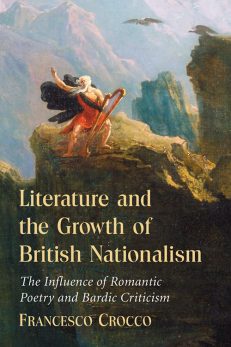Literature and the Growth of British Nationalism
The Influence of Romantic Poetry and Bardic Criticism
$39.95 Original price was: $39.95.$19.99Current price is: $19.99.
In stock
About the Book
This book explores how British Romantic poetry—the writing, reading, and critical reception of it—reinforced British nationalism in the 19th century, ripening the political processes of nationhood that began with the first Act of Union in 1707. Using archival research on literary collections, criticism and reviews, this study documents the rise of bardic criticism in the 18th century, a style of literary criticism that reinvented the vernacular poet as a national bard and established a national role for poetry. Within this context, this book offers a new reading of major works by Romantic poets from Wordsworth and Coleridge to Felicia Hemans and Anna Letitia Barbauld, illuminating the ways they corroborated the public image of poets as bona fide national bards and advanced British nationalism, even when they intentionally set out to oppose or reform the politics of state.
About the Author(s)
Francesco Crocco is the associate director of the online writing lab at Excelsior College. His research interests include game-based learning, gamification, and utopian studies. He lives in Lafayette, Louisiana.
Bibliographic Details
Francesco Crocco
Format: softcover (6 x 9)
Pages: 256
Bibliographic Info: 5 photos, notes, bibliography, index
Copyright Date: 2014
pISBN: 978-0-7864-7847-7
eISBN: 978-1-4766-1600-1
Imprint: McFarland
Table of Contents
Acknowledgments ix
Preface 1
Introduction 3
1. Bardic Criticism, the Canon and the Invention of the Poet-Bard 19
2. Wordsworth’s Bardic Poetics in Lyrical Ballads 52
3. Wordsworth and Class (Un)Consciousness 88
4. Coleridge, Religious Nationalism and the Anxiety of Empire 120
5. Patriot Women and the Future of Empire 153
Conclusion: William Blake’s Prophecies and the Limits of Nationalism 182
Chapter Notes 193
Bibliography 225
Index 241
Book Reviews & Awards
- “Written in a wonderfully accessible style…thought-provoking work.”—European Romantic Review
- “An excellent book, thoroughly well thought out and compellingly argued, with a wealth of insightful, and often genuinely revealing, close reading coupled with a masterful command of the secondary literature.”—Stephen C. Behrendt, University of Nebraska
- “In contrast to recent books that focus on the artistry and historiography of balladry in the Romantic period, and in a style that is admirable for its lucidity and precision, this new book argues cogently that the themes of nationalism and, in the book’s outstanding conclusion, anti-nationalism constitute arguments about the changing nation in which these ballads were wrought.”—Terence Hoagwood, Texas A&M University.





